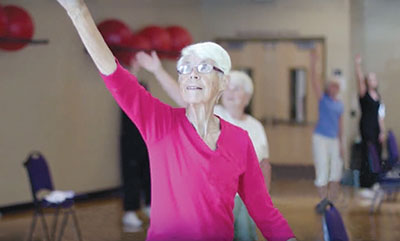10,000 baby-boomers turn 65 every day.
There’s no disputing the demographics. Baby boomers are at or rapidly approaching retirement age.

“Ten-thousand baby boomers turn 65 every day,” says Basia Belza, a core investigator at the Health Promotion Research Center (HPRC) within the University of Washington School of Public Health.
Those numbers are growing even faster for the over-85s, quadrupling from 5.5 million in 2010 to 19 million by 2050, the U.S. Census Bureau predicts.
The field of “healthy aging”—keeping older Americans physically and cognitively healthy for as long as possible—is an important research opportunity for the UW School of Public Health, says Jeffrey Harris, new chair of the School’s Department of Health Services and former director of the Health Promotion Research Center, one of 26 Prevention Research Centers in the U.S. funded by the Centers for Disease Control and Prevention (CDC).
“A fall for an older adult can be a death sentence,” Harris says. “What are we doing to help them cope and live independently for as long as they can?”
The Importance of Staying Fit

The HPRC, home to many of the UW’s research efforts on healthy aging, was recently named the coordinating center for a new CDC-funded Healthy Brain Research Network to promote cognitive health among older Americans. The network includes five other universities.
Examples of the network’s projects: Hosting a webinar on cognitive aging, helping states develop Alzheimer’s work plans, and reviewing research on best ways to measure the benefits of physical activity on cognitive impairment.
One highly successful example of HPRC’s work has been EnhanceFitness, a group exercise program for seniors developed by the HPRC and its partners in the 1990s. More than 50,000 people have participated in the program, which is offered at YMCAs and other agencies across the country.
Research has shown the exercise program improves physical, emotional and social health, while resulting in lower health costs and fewer deaths among Medicare enrollees.
HPRC’s current core research project, funded by the CDC, aims to design a system to increase referrals from physical therapists (PTs) to EnhanceFitness classes. “It’s a win-win,” says Principal Investigator Miruna Petrescu-Prahova, assistant professor of Health Services. “PTs can send patients to a trusted program that helps to address physical therapy goals while the Y gets new people and possibly new members.”
Researchers are focusing on physical therapists because they have many opportunities to connect patients to programs, Petrescu-Prahova says. The HPRC will test a toolkit to improve links between PTs and YMCAs in a randomized controlled trial in 20 YMCAs across 13 states.
Mall Walking—An Easy Way to Exercise
Getting more seniors walking is another goal of SPH researchers. Belza, also a professor in the School of Nursing and an adjunct professor in Health Services, led development of a CDC-funded mall-walking guide this year.
The resource guide touts the benefits of walking. Adults who engage in regular brisk walking are at lower risk of heart disease, stroke, and some cancers. They also may sleep better, lower their risk for falls, and delay the onset of dementia.
Belza says malls are a particularly good place for older adults because of their climate control, flat surfaces, security guards, water fountains, accessible free parking, and bathrooms, to name a few benefits.
The guide was highlighted recently by U.S. Surgeon General Vivek Murphy in a national Step It Up! campaign for more walking and walkable communities.
Managing Depression
More than half of older adults have undiagnosed depression, often classified as minor depression. “It can be just as debilitating as major depression,” says Lesley Steinman, a research scientist at HPRC.
She works on a program called PEARLS (Program to Encourage Active, Rewarding Lives), which was developed by HPRC and the local Area Agency on Aging to better recognize and treat depression in older adults. Trained providers visit clients in their homes.
So far, PEARLS is offered in 35 programs across 15 states and has reached more than 2,000 people. In King County, a tax levy funds efforts to focus on veterans and others.
Florida will soon become the first state to offer PEARLS at a statewide level. Assistant Professor Norma Coe and PhD student Sara Beth Barnett are conducting an economic evaluation of PEARLS to see if it saves money by reducing hospitalization and nursing home placements.
The UW’s new CoMotion center currently trains providers on how to use PEARLS. CoMotion seeks to take innovative solutions from UW and give them wider impact.
(By Jeff Hodson)
